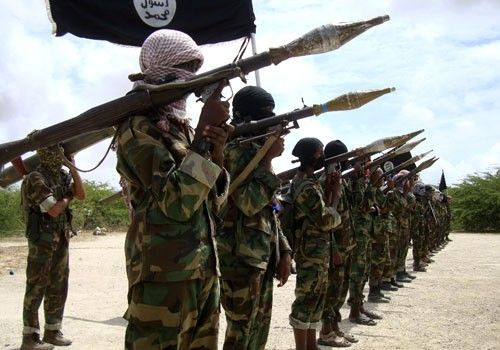At least 10 peacekeepers killed in Somalia battle

The African force protecting Somalia's government acknowledged on Friday at least 10 of its troops had been killed in battle in Mogadishu and said the true toll could still climb, after rebels showed dozens of bodies.
East African officials held an emergency meeting to discuss the deteriorating situation in Somalia, five days after troops from Kenya poured across the border in pursuit of kidnappers it says are linked to Somalia's al-Shabaab rebels.
The Kenyan military said its forces had taken two towns, but a spokesman for a militia allied with the government in Mogadishu said the advance had been stalled by heavy rain.
Somalia's Western-backed government has claimed victories this year in the capital against al-Shabaab, the al Qaeda-linked rebel movement fighting to impose a strict form of Islamic law.
But Shabaab fighters still hold some districts of the capital. Thursday saw a heavy battle in the capital's Daynile district.
Al Shabaab displayed dozens of bodies in army fatigues to journalists late on Thursday, saying they were AU soldiers killed in the latest fighting in the capital. Reuters television filmed militants tossing some bodies out of a truck.
A Reuters photographer counted 76 bodies, some of whom had helmets and flak jackets laid out nearby.
The African Union peace force, made up mainly of 9,000 troops from Burundi and Uganda that defend the Mogadishu government, initially called the claims that large numbers of its troops were killed propaganda. However, it acknowledged on Friday taking casualties.
As was to be expected, given Daynile's significance, the operation has encountered heavy resistance but steady progress is being made, AU force commander Major General Fred Mugisha said in a statement.
The statement said at least 10 of the force's soldiers had been killed and two were missing, adding: As the operation is ongoing, the mision has been unable to provide final casualty figures at this stage.
Burundi said at least six of its soldiers in the peacekeeping force had been killed.
A Somali military official said more than 10 Somali government soldiers were missing. A senior Burundian military official said 11 Burundi peacekeepers were missing. Both officials asked not to be identified due to the sensitivity of the operation.
KENYANS TAKE TOWNS
After a spate of kidnappings against foreigners that have threatened neighbouring Kenya's tourism industry, Kenyan troops moved suddenly into southern Somalia on Sunday to try to secure the porous border from the al Qaeda-linked Shabaab rebels.
Kenyan military spokesman Emmanuel Chirchir said on Friday Kenyan troops had secured the towns of Oddo and Kolbio, near the frontier.
The troops, backed by Western-backed Somali government troops and allied militia, have been blocked by rain from making fast progress to capture rebel bastions in the south.
We have not taken a step further today. It is raining, Abdinasir Serar, a spokesman for Ras Kamboni, a militia nominally allied to the government, told Reuters.
Al-Shabaab fighters have hunkered down in the rebel bastion of Afmadow where residents are bracing for a confrontation.
A Kenyan security official said two Kenyan soldiers were killed and four wounded when they were ambushed by al Shabaab militants in an area close to Afmadow.
Its large-scale incursion into Somalia makes Kenya the latest neighbour to become deeply involved on the battlefield in a country that has not been effectively controlled by a government in nearly two decades. Al-Shabaab have claimed responsibility for attacks in neighbouring countries, and are viewed throughout the region as a serious security threat.
Regional group IGAD held an emergency meeting to discuss Somalia in Addis Ababa, capital of Ethiopia, on Friday. Kenya sent its foreign and defence ministers and armed forces head.
Kenya has long looked nervously at its anarchic neighbour and has launched some brief incursions in the past, but this operation is on a much larger scale, raising the risk of reprisals from al Shabaab.
Al Shabaab forces were driven out of most of Mogadishu in August under sustained pressure from the government and the AU troops as well as internal rifts and funding shortages.
However, the militants have still managed to carry out deadly attacks against government institutions. Earlier this month they carried out the worst attack on Somali soil since 2007 -- a suicide truck bombing that killed more than 70 people.
Kenyan security forces arrested two doctors on Friday in a Nairobi neighbourhood with a large Somali community.
Ali Omar Salim and Adan Hassan Hillow were charged with engaging in organised criminal activity on or before October 20 in Nairobi ... (and) found engaging in an organised criminal activity by being members of al Shabaab, their charge sheet at Nairobi chief magistrate's court said.
Deputy police spokesman Charles Owino said the two had been detained in Nairobi's Eastleigh suburb earlier this week.
We are cracking down everywhere. Within the country and in Somalia, Owino said.
A local al-Shabaab website said Kenyan troops had arrested three clerics on Thursday, including Sheikh Hassan Hussein, who is on a U.N. sanctions list. A Security Council report on Tuesday said Hussein had been involved in recruiting new members and soliciting funds for the militants.
Residents said the cleric was arrested shortly after he finished giving a lesson at a mosque in Eastleigh.
Reuters reporters have in the past seen al-Shabaab fighters in Eastleigh, sometimes returning for medical treatment. Somali parents living there complain that some mosques actively recruit youths to fight for al Shabaab.
© Copyright Thomson Reuters 2024. All rights reserved.





















